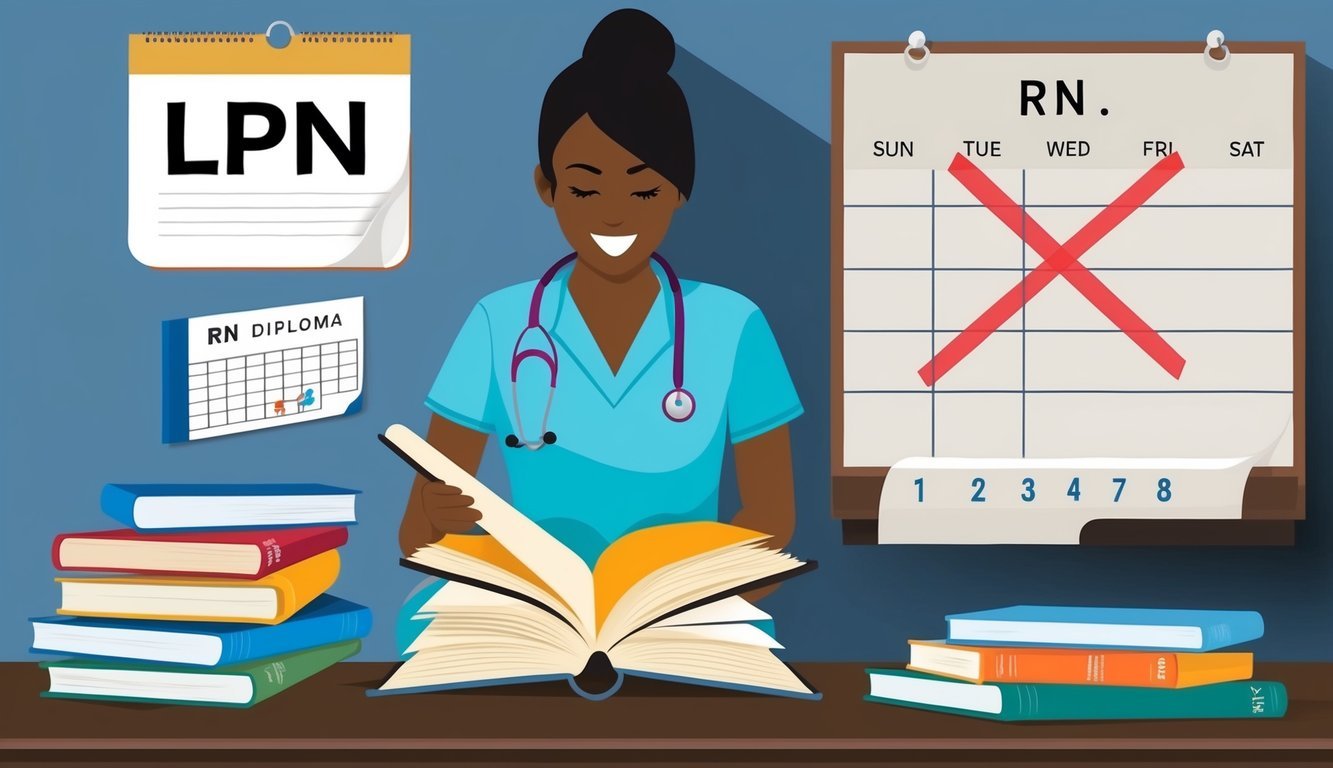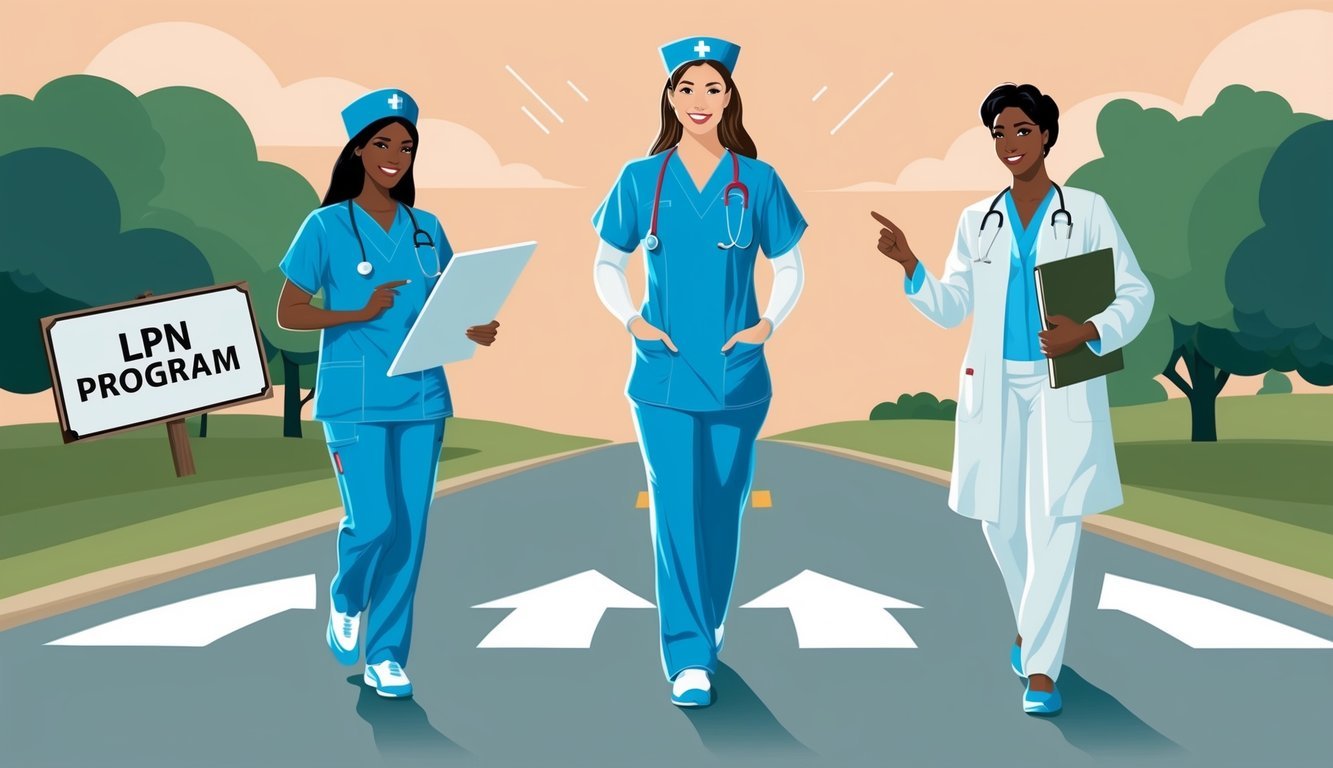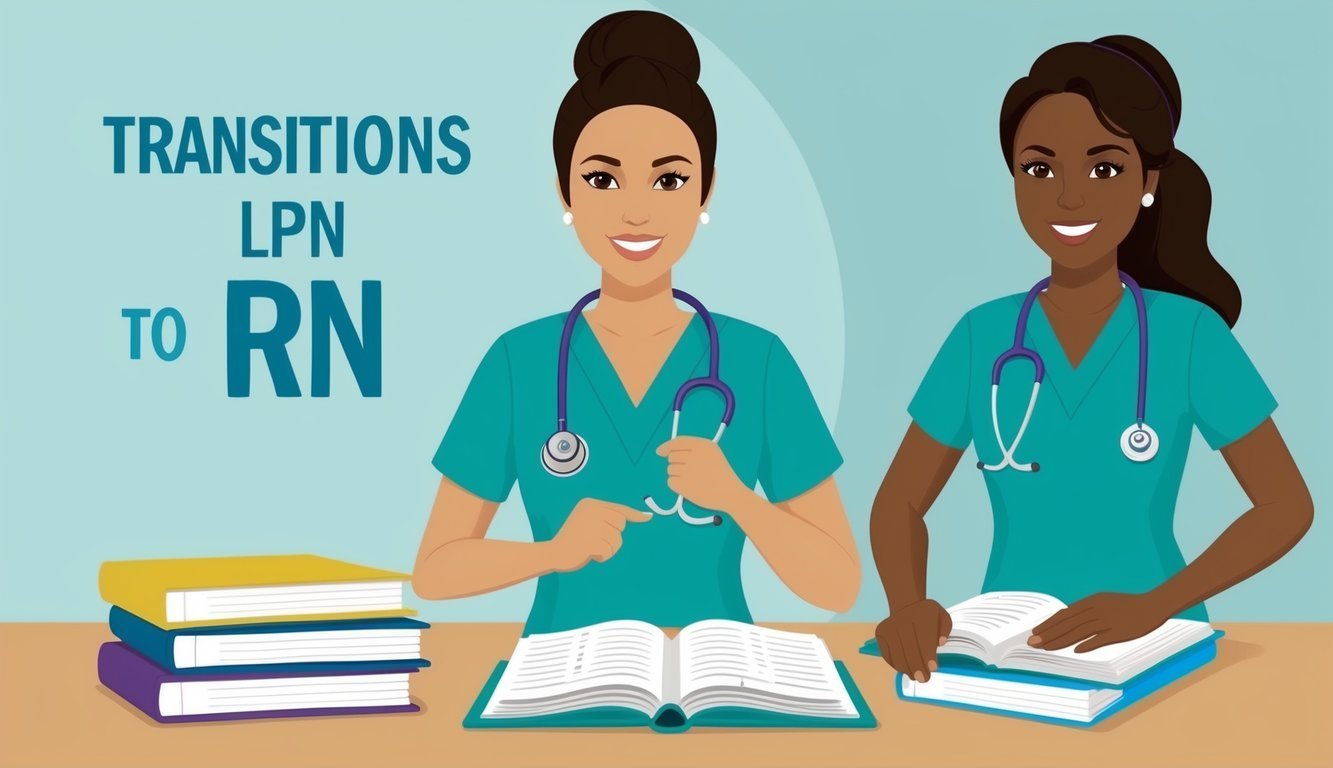Transitioning from a Licensed Practical Nurse (LPN) to a Registered Nurse (RN) is a smart move for your nursing career.
Many programs allow you to achieve this goal in just one year.
This accelerated path not only enhances your nursing skills but also opens doors to greater job opportunities and higher salaries.
When considering a one-year LPN to RN program, it’s important to understand the admission criteria, curriculum requirements, and the benefits of becoming an RN.
These programs are designed to build on your existing knowledge, providing you with advanced training and practical experience that prepares you for the challenges of registered nursing.
The investment of time and effort in an LPN to RN transition is well worth it.
You’ll gain not just educational credentials, but also a chance to make a greater impact on patient care and advance your career in nursing.
Key Takeaways
- A one-year LPN to RN program enhances your career opportunities.
- Understanding admission criteria helps you prepare effectively.
- Additional training allows you to improve patient care and job prospects.
Understanding LPN to RN Programs

LPN to RN programs offer a pathway for Licensed Practical Nurses to advance their careers.
You can choose between different tracks, such as LPN to ADN or LPN to BSN, depending on your goals.
Let’s explore these options in detail.
Overview of Bridge Programs
LPN to RN bridge programs enable LPNs to become Registered Nurses (RNs) more quickly than starting from scratch.
These programs typically take about one year to complete and can be offered in online, hybrid, or on-campus formats.
Key components include:
- Clinical Experience: Hands-on practice in healthcare settings.
- Coursework: Covers advanced nursing topics.
- Flexibility: Many programs allow part-time or online study.
Look for programs accredited by recognized bodies, such as the Accreditation Commission for Education in Nursing (ACEN), to ensure quality education.
For more details on specific programs, you can check resources like NursingProcess.org.
Pathways: LPN to ADN and LPN to BSN
You can choose between two main pathways in LPN to RN programs:
-
LPN to ADN (Associate Degree in Nursing):
- Duration: About 1 year.
- Focus: Practical nursing skills and theory.
- Outcome: Eligible for RN licensure, typically in a hospital setting.
-
LPN to BSN (Bachelor of Science in Nursing):
- Duration: About 2-3 years.
- Focus: Broader knowledge base, leadership, and management skills.
- Outcome: More job opportunities, including administrative positions.
Choosing between these pathways depends on your career goals and desired scope of practice.
Best LPN to RN Programs
Several LPN to RN programs stand out for their quality.
Here are some factors to consider when identifying the best programs:
| Program Name | Type | Duration | Accreditation |
|---|---|---|---|
| North Dakota State College of Science | Online | 1 year | ACEN |
| Western Governors University | Online | 1-2 years | CCNE |
| University of Phoenix | Hybrid/Online | 1-2 years | CCNE |
When researching programs, consider factors such as tuition costs, admission requirements, and clinical experience.
Programs like those listed above provide a solid foundation for advancing your nursing career.
For further guidance, visit Nurse.org.
Admission Criteria and Preparation
Understanding the admission criteria and preparation will help streamline your path to enrolling in a one-year LPN to RN program.
Knowing the entry requirements and the application process is essential for a successful transition.
Entry Requirements
To apply for a one-year LPN to RN program, you typically need to meet several key requirements.
Common Admission Requirements:
| Requirement | Details |
|---|---|
| Prerequisite Coursework | Must have completed courses in biology, chemistry, and human anatomy. |
| GPA Standards | Generally a minimum GPA of 2.5 or higher. |
| LPN License | A valid, active LPN license is necessary. |
| Criminal Background Check | A background check is required prior to admission. |
| Drug Screen | A negative drug screening is usually mandatory. |
You may also receive credit for prior learning, based on your experience as an LPN.
Application Process and Prerequisite Coursework
The application process involves several steps to ensure you are ready for the program.
Start by completing your online application for the institution.
Next, you will need to submit your academic transcripts and proof of your LPN license.
Important Steps:
- Mandatory Information Session: Attend the required session to get details about the program.
- Course Requirements: Ensure you have completed any prerequisite courses, such as nursing fundamentals and basic sciences.
- Documentation: Prepare your official transcripts and any other documents that demonstrate your academic history.
Stay organized and follow any specific instructions from your chosen program, as this can make a significant difference in your application success.
For more details, check NursingProcess.org.
Curriculum and Academic Requirements
The curriculum for a one-year LPN to RN program focuses on advanced nursing knowledge and practical skills.
It combines theoretical coursework, hands-on training, and clinical experiences to prepare you for a Registered Nurse role.
Below are the essential components of this curriculum.
Nursing Courses and Content
In an LPN to RN program, you will encounter a variety of nursing courses that build on your prior knowledge.
Some of the key subjects include:
- Nursing Theory: This course covers the principles of nursing practice, ethics, and patient care.
- Pharmacology: You will learn about drug classifications, side effects, and proper medication administration.
- Nursing Practice: This provides hands-on training, enabling you to apply theoretical knowledge in real-world settings.
Typically, the curriculum includes around 61 credits featuring required courses and electives.
You will also study specialized topics to enhance your expertise and cater to specific interests in nursing.
Clinical Experiences and Training
Clinical experiences are vital for your development.
You will complete a set number of clinical hours in healthcare facilities under the guidance of experienced RNs.
This hands-on training allows you to apply classroom knowledge in real-life scenarios.
Key elements of clinical training include:
- Simulation Labs: These labs offer realistic nursing situations where you practice skills in a controlled environment.
- Direct Patient Care: You will provide care in various settings, allowing you to adapt to different clinical situations.
This practical experience is essential for developing critical thinking and decision-making skills necessary for your future career.
Online Learning Advantages and Challenges
Many LPN to RN programs are offered online, making them flexible and accessible.
Online learning allows you to balance your studies with work and personal commitments.
You can engage in coursework at your convenience, which is particularly beneficial for those with busy schedules.
However, online learning also has challenges.
You need strong self-discipline to stay on track.
Technical issues may arise, and you miss out on face-to-face interactions with peers and instructors.
In summary, online learning offers convenience, but requires commitment to succeed.
You will need to manage your time effectively to meet deadlines and complete assignments while participating in clinical training.
Licensing and Certification
As you transition from a Licensed Practical Nurse (LPN) to a Registered Nurse (RN), understanding licensing and certification is crucial.
This process ensures that you meet the necessary standards to practice safely and effectively as a nurse.
The NCLEX-RN Examination
To obtain your RN license, you must pass the NCLEX-RN Examination.
This test assesses your knowledge and skills in nursing and is crucial for your licensure.
Key areas covered in the exam include:
- Safe and Effective Care Environment
- Health Promotion and Maintenance
- Psychosocial Integrity
- Physiological Integrity
The NCLEX-RN has a variable length, ranging from 75 to 145 questions.
Most states require a passing score to move forward with your RN licensure.
NCLEX-RN pass rates can vary by state and institution, so it’s essential to study thoroughly.
For more information about the exam, consider visiting the National Council of State Boards of Nursing website.
Licensure Provisions and State Regulations
After passing the NCLEX-RN, you must apply for your nursing license through your state board of nursing.
Each state has specific licensure provisions and regulations, which may include:
- Background checks
- Proof of education and training
- Continuing education requirements
It’s important to understand the specific requirements in your state as they can vary widely.
For instance, some states may require additional coursework or clinical hours.
Be sure to check your state’s board of nursing website for detailed information.
This ensures you remain compliant with state laws and can practice without any issues.
Career Outcomes and Opportunities

After completing a one-year LPN to RN program, you can look forward to various roles and opportunities.
These include responsibilities that come with being a registered nurse, your potential job prospects, and options for further education.
Roles and Responsibilities of an RN
As a registered nurse, you will have many important duties.
Your main responsibility is to provide care to patients.
This includes assessing health conditions, creating care plans, and administering treatments.
You will also monitor patients’ progress and communicate with doctors and other health professionals.
Other tasks might include educating patients about their health and wellness.
You will need strong communication skills to effectively explain complex medical information in an understandable way.
Furthermore, RNs often supervise licensed practical nurses (LPNs) and nursing assistants.
In addition to direct patient care, RNs may engage in administrative tasks.
These may involve maintaining patient records and ensuring compliance with healthcare laws and regulations.
Employment Prospects and Job Placement Rates
The job outlook for registered nurses is quite promising.
According to the Bureau of Labor Statistics, employment for RNs is projected to grow much faster than the average for all occupations.
Many factors contribute to this growth:
- An aging population
- Increased emphasis on healthcare
- Expanding healthcare access
For those who complete a one-year program, job placement rates are high.
Many programs report placement rates of 80% or greater within six months of graduation.
This shows that completing your LPN to RN bridge program can lead to stable employment in the nursing field.
Continuing Education and Professional Growth
RNs who wish to advance their careers need continuing education.
Many states require RNs to complete a certain number of continuing education hours to maintain their licenses.
Pursuing certifications in specialty areas, such as critical care or pediatrics, can enhance your skills and marketability.
You may also consider advanced degrees.
For example, a Bachelor of Science in Nursing (BSN) or even a Master of Science in Nursing (MSN) for leadership roles.
Participating in workshops, seminars, and online courses can keep your knowledge current.
Engaging in professional organizations can also provide networking opportunities and resources for career advancement.
Consider resources like Nurse.org for more information.
Frequently Asked Questions

In this section, you will find important information about the admission requirements, clinical experience, credentials, accreditation, and financial aid for 1-year LPN to RN programs.
Understanding these details can help you make informed decisions about your nursing education.
What are the admission requirements for a 1-year LPN to RN program?
Admission requirements can vary by program.
Typically, you will need a high school diploma or GED and a valid LPN license.
Some programs may also require a minimum GPA and standardized test scores.
Check specific school websites for exact details.
Can LPN experience count towards RN clinical hours in an accelerated program?
In many cases, LPN experience can contribute to your clinical hours.
However, this depends on the policies of the specific program.
It’s best to confirm with the school directly to understand how your experience may apply.
What are the NCLEX-RN pass rates for graduates of 1-year LPN to RN programs?
Pass rates for the NCLEX-RN exam can differ between programs.
Many programs boast pass rates above the national average, which is around 88%.
Review individual program statistics to gauge success rates.
What types of credentials are awarded at the completion of a 1-year LPN to RN program?
Upon completing a 1-year LPN to RN program, you will typically earn an Associate Degree in Nursing (ADN).
This credential allows you to sit for the NCLEX-RN exam and become a registered nurse.
Are online 1-year LPN to RN programs as accredited as traditional on-campus programs?
Most accredited online programs are held to the same standards as traditional ones.
Ensure the program is accredited by a recognized body, like the Accreditation Commission for Education in Nursing (ACEN) or the Commission on Collegiate Nursing Education (CCNE).
This guarantees quality education.
What financial aid options are available for students in 1-year LPN to RN programs?
Financial aid options include federal grants, scholarships, and student loans.
To determine your eligibility, complete the Free Application for Federal Student Aid (FAFSA).
Many schools also offer their own scholarships, so explore those as well.

